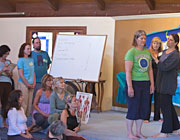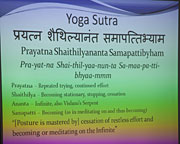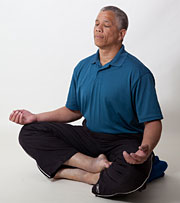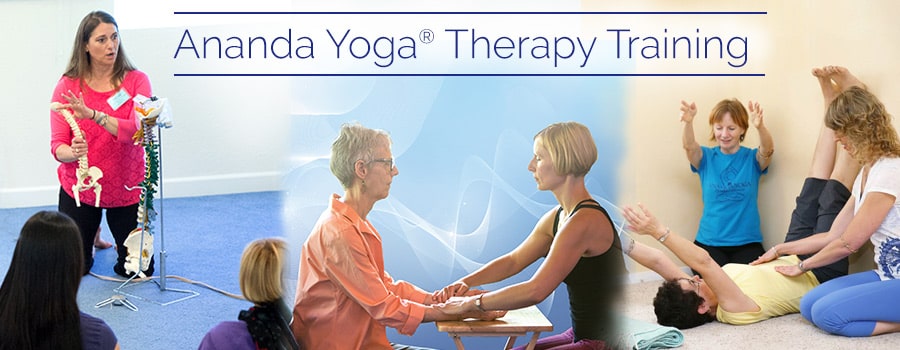SYLLABUS
Ananda Yoga® Therapy Training: Health Challenges-2
Course Hours: Total = 57 (Residential and Distance)
- Residential = 30
- Distance = 27 (as Home Practicum)
- Practicum = 27 (as Home Practicum)
Prerequisites
- Enrollment in Ananda Yoga® Therapy Training; AND,
- Ananda Yoga® Therapy Training: Principles, AND,
- Ananda Yoga® Therapy Training: Health Challenges-1, AND
- Ananda Yoga® Therapy Training: Ayurveda
Teaching Format
This is a 5-day residential course which includes a combination of lecture, discussion, and case studies, and practicum (distance).
Course Description
Yoga therapy has proved extremely helpful for many chronic health conditions. This course covers Obesity, Diabetes, Thyroid Disorders, Congestive Heart Failure, Autoimmune Disorders, Chronic Pain, Fibromyalgia, Chronic Fatigue Syndrome, Headaches (Tension & Migraine), Asthma, COPD, Multiple Sclerosis, and Parkinson's Disease, and PTSD. We review the anatomy of systems involved and basic pathophysiology for these conditions. Medical / ayurvedic/ subtle energy perspective on these health challenges are addressed to guide the therapist choice of interventions. Case studies are presented to provide time in practical application of the concepts in class. Students also apply the knowledge gained by writing up their experience working with volunteer clients in their community and then receiving individualized feed back from course faculty.
Faculty: Ananda Ministers and Certified Meditation Teachers
Nayaswami Mangala Loper-Powers RN, MN, NP, E-RYT 500, Ananda Yoga Therapist, C-IAYT, Clinical Ayurvedic Specialist
Maitri Jones, RN, BSN, E-RYT 500, Ananda Yoga Therapist, C-IAYT
Barbara Bingham, RPT, BS, CYT, Ananda Yoga Therapist
Required Texts/Reading Materials
- McCall, Timothy B. Yoga as Medicine: The Yogic Prescription for Health & Healing. New York: Bantam, 2012.
- Ananda Yoga TherapyTraining: Health Challenges-2 Manual. The Expanding Light, 2018.
Learning Objectives
At the completion of the course, students will know:
- Basic pathophysiology and medical terminology of Obesity, Diabetes, Congestive Heart Failure, Autoimmune Disorders, Chronic Pain, Fibromyalgia, Headaches (Tension & Migraine), Asthma, COPD, PTSD, Multiple Sclerosis, and Parkinson's Disease, including how they impact a person’s life physically, mentally, emotionally, and spiritually
- What research has been done to support the use of yoga therapy in these conditions, including an approach to Trauma-Sensitive Yoga
- Rationale that guide a therapists choices of pranayama, energization exercises, asanas, restorative poses, affirmations and visualization/meditation techniques or each condition
- How to assess your clients’ needs in terms of developing an individualized yoga therapy plan for them
- How to evaluate your yoga therapy plans and to modify them as needed
- Ways to develop group classes for people with these conditions
Subject Matter/Competencies Covered
Section 1. Yoga Foundations
Category 1.1. Yoga Teachings and Philosophy
1.1.1. Familiarity with the evolution of the teachings and philosophy of the yoga tradition and its relevance and application to yoga therapy, including teachings from Vedic and post-Vedic periods, Samkhya, Yoga,Tantra, and Ayurveda. Examples of concepts and models from the above teachings and philosophy relevant to yoga therapy, include but are not limited to,
a. tanmatra/bhuta/indriya (subtle element/gross elements/senses);
b. purusha/prakrti (consciousness/material world);
c. pancamaya kosha (dimensions of the human system);
d. guna (fundamental forces of nature); and
e. duhkha (suffering/discomfort).
Category 1.2. Yoga and the Mind
1.2.2. Knowledge of yoga perspectives on distracted/disturbed conditions of mind and their expressions as expressed in such texts as the Yoga Sutras, the Bhagavad Gita, and other texts, including but not limited to
1.2.2.1. klesha (affliction);
1.2.2.3. duhkha and daurmanasya (suffering/discomfort and negative attitude/thinking), sarupyam (identification with the contents of the mind or seer taking the same form as the mind).
Category 1.3. Framework for Health and Diseasee
1.3.1. Knowledge of the basic perspectives on health and disease from yoga and Ayurveda relevant to the practice of yoga therapy.
1.3.1.2. subtle anatomy;
1.3.1.3. tri-dosha (effect of the elements on the physical body);
1.3.1.8. prana vayu (prana, apana, vyana, udana,samana);
1.3.1.9. prana prakopa (disturbance of the vayu);
1.3.2. Knowledge of categorizing illness.
1.3.2.1 Development/evolution of disease (samprapti [pathogenesis]), including but not limited to direction, intensity, onset, and duration and their influence on the ease or difficulty of healing and disease management.
1.3.2.2 Setting priorities:symptoms/pacification (shamana [short term]) and purification/strengthening (shodhana [long term]).
Section 2. Biomedical and Psychological Foundations
Category 2.1. Anatomy and Physiology
2.1.1. Knowledge of human anatomy and physiology, including all major systems of the body and their interrelationships, as relevant to the work of a yoga therapist.
2.1.2. Knowledge of biomechanics and movement as they relate to the practice of yoga and the work of a yoga therapist.
2.1.3. Knowledge of common pathologies and disorders of all the major systems, including symptoms, management, illness trajectories, and contraindications, as relevant to the work of a yoga therapist.
Category 2.2. Additional Biomedical Knowledge
2.2.1. Familiarity with commonly used drugs and surgical procedures, as relevant to the work of a yoga therapist.
2.2.2. Familiarity with common medical terminology.
2.2.3. Knowledge of how to reference current healthcare information relevant to the work of a yoga therapist, including pathologies, disorders, drugs,
Category 2.3. Psychology and Mental Health
2.3.1 Basic knowledge of commonly occurring mental health conditions—from psychological distress to psychiatric conditions—their symptoms, and common approaches/interventions, as they relate to the work of a yoga therapist.
2.3.2 Basic knowledge of psychological concepts and terminology, including mood, cognition, behavior, and personality, as relevant to the work of a yoga therapist.
Category 2.4. Additional Knowledge
2.4.1 Familiarity with models of human development, including developmental stages, lifecycles, and personality, and their importance to medical and psychological health and well-being.
2.4.2 Familiarity with the influence of familial, social, cultural, and religious conditioning on mental and medical perspectives of health and healing.
Category 2.5. Body and Mind Integration 2.5.1. Knowledge of the interaction of the body, breath, mind, intellect, and emotions in health and well-being.
Section 3. Yoga Therapy Tools and Therapeutic Skills
Category 3.1. Yoga Therapy Tools
3.1.1 In-depth knowledge of the application of yama and niyama.
3.1.2 In-depth knowledge of the range of yoga practices and their potential therapeutic effects for common conditions Practices may include, but are not limited to,
3.1.3 In-depth knowledge of contraindications of yoga practices for specific conditions and circumstances.
Category 3.2 Basic Principles of the Therapeutic Relationship
3.2.1. In-depth knowledge of, and observed capacity for, well-developed communication skills: listening, presence, directive and non-directive dialogue.
3.2.2. Demonstrated ability to recognize, adjust, and adapt to specific client/student needs in the evolving therapeutic/professional relationship.
3.2.3. Demonstrated ability to recognize and manage the subtle dynamics inherent in the therapist/client relationship.
3.2.4. In-depth Knowledge of the scope of practice of yoga therapy and how to assess the need for referral to other professional services.
Category 3.3 Principles and Skills for Educating Clients/Students
3.3.1. In-depth knowledge of and demonstrated ability to implement effective teaching methods, adapt to unique styles of learning, provide supportive and effective feedback, acknowledge the client's/student's progress, and cope with unique difficulties/successes.
3.3.2. In-depth knowledge of and demonstrated ability to transmit the value of self-awareness and self- responsibility throughout the therapeutic process.
3.3.3. In-depth knowledge of and demonstrated ability to develop and adjust appropriate practice strategies to the client/student.
Section 4. Practicum
Category 4.1 Providing Yoga Therapy
4.1.1. Demonstrated ability to conduct intake and assess the client/student, including
4.1.1.1. Taking a history of the client and his/her condition(s); and
4.1.1.2. Assessing the current condition using the tools relevant to the yoga therapist, including an evaluation of the physical, energetic, mental, emotional, and spiritual dimensions of well-being.
4.1.2. Demonstrated ability to elicit the goals, expectations, and aspirations of the client/student.
4.1.3. Demonstrated ability to integrate information from the intake, evaluation, and observation to develop a working assessment of the client's condition, limitations, and possibilities.
4.1.4. Demonstrated ability to apply knowledge of how to determine which aspects of the client/student's conditions, goals, and aspirations might be addressed through yoga therapy.
4.1.5. Demonstrated ability to identify priorities and set both long- and short-term goals with the client/student.
4.1.6. Demonstrated ability to apply knowledge of pacification, purification, and strengthening strategies.
4.1.7. Demonstrated ability to apply knowledge of strategies that address common disorders and pathologies of the major human systems and common mental health conditions, as well as other goals and aspirations of the student as relevant to the work of a yoga therapist.
4.1.8. Demonstrated ability to apply knowledge of how to combine intake, evaluation, observations, and working assessment to develop an appropriate practice or session strategy for individual clients/students as well as group classes, taking into consideration the holistic nature of the individual.
4.1.9. Demonstrated knowledge of how to choose and prioritize the use of yoga tools and techniques, including selecting, sequencing, adapting, and modifying yoga practices appropriate to the needs of clients.
4.1.10. Demonstrated ability to teach or deliver the appropriate practices for individuals as well as groups, taking into consideration the assessment of their conditions, limitations, possibilities, and the overall practice strategy.
4.1.11. Demonstrated ability to facilitate the client/student's experience of the practice.
4.1.12. Demonstrated ability to develop and maintain therapeutic relationships.
4.1.13. Demonstrated ability to provide follow up and re-planning.
Section 5. Professional Practice
Category 5.1. Ethical Principles
5.1.1. In-depth knowledge of yoga practices and methods for self-inquiry related to establishing, practicing, and maintaining ethical principles.
5.1.4. In-depth knowledge of the scope of practice of yoga therapy, resulting in the demonstrated ability to discern the need for referral to other modalities.
Category 5.2. Legal, Regulatory, and Business Issues Pertaining to Yoga Therapy
5.2.2 Basic knowledge of business practices relevant to the work of a yoga therapist, including record keeping, planning, and financial management.
Category 5.3. Relationships with Peers, Mentors, Clinicians, and Organizations
5.3.1. Basic knowledge of other healthcare fields and their potential role in and relevance to the work of a yoga therapist.
Course Completion Requirements
- Attendance at all classes.
- Completion of all assigned readings. (see below)
- Participation in class discussions and activities (including case studies, review sessions, practicums). Participation needs to reflect that the student has learned and begun to assimilate the information from their assigned readings. (The faculty will be assessing whether the student has achieved the level of knowledge and appropriate application of that knowledge according to the IAYT Competencies that apply.)
- Satisfactory performance (80%) on in-class (closed-book) Quizzes. This will indicate an achievement of the stated course Learning Objectives. Students will be given Answer Keys to the Quizzes immediately after taking them, and there will then be time for further Q & A and group discussion with faculty.
- During in-class practicums, students must provide yoga therapy interventions in a safe and appropriate manner, in accordance with the IAYT Competencies for providing yoga therapy (Section 4, Category 4.1), as determined by supervising faculty. Students are given immediate feedback from faculty and peers on all aspects of their observational, assessment, decision-making, planning, teaching and record-keeping skills.
- Satisfactory completion of the Home Practice Assignment. Students are given written feedback by supervising faculty, along with an offer to speak in person or by phone in addition. If the expected standard of satisfactory performance (set by IAYT Standards and Competencies) is not met, then students will be given additional guidance and assignments as needed until they can demonstrate the expected competency.
- If any of the above requirements or expectations are not met, the student will be counseled and/or given additional assignments in order to help them be able to demonstrate satisfactory performance.
Reading Assignments
Ananda Yoga Therapy Training: Health Challenges-2 Manual. The Expanding Light, 2018.
In Yoga as Medicine, Chapters:
10 –Asthma
14 –Chronic Fatigue Syndrome
16 –Diabetes
17 –Fibromyalgia
18 -Headache
19 –Heart Disease
26 –Multiple Sclerosis
27 –Obesity
Ananda Yoga Therapy Training
- Overview
- Flow Chart of Ananda Yoga® Therapy Training Courses
- Course Syllabi
- Tuition Costs
- Ananda Yoga® Therapy Training Courses Scheduled
- Frequent Questions
- Instructors
- Apply for Level 1
- Student Handbook with Costs
- Bridge to Ananda Yoga
Upcoming Courses in date order
- Bhagavad Gita Retreat
- The Essence of the Yoga Sutras According to Paramhansa Yogananda
- Ananda Meditation® Teacher Training - In Person
- Advanced Pranayama
- Ananda Yoga® Assistantship
- Ananda Yoga® Therapy Training: Principles
- Ananda Yoga® Advanced Training: Therapeutic Yoga for Seniors and Bone Strength
- Restorative Ananda Yoga® Teacher Training - In Person
- Ananda Yoga® Therapy Training: Musculoskeletal–1
- Ananda Yoga® Therapy Training Online: Ayurveda
- Ananda Yoga® Therapy Training Online: Health Challenges–1
- Ananda Meditation® Solutions
- Ananda Spiritual Counseling® Training - In Person
- Ananda Yoga® Therapy Training: Musculoskeletal–2
- Ananda Yoga® Therapy Training Online: Health Challenges–2
- Ananda Yoga® Therapy Training: Psychology and Mental Health
- Ananda Yoga® Therapy Training: Holistic Health Therapist Training
Nursing CEU Eligible: details coming

How to Choose a
Yoga Teacher Training Program

“My 4 weeks of Ananda Yoga Teacher Training was one of the most fulfilling and spiritually transforming periods in my life. All of the faculty, along with the entire Ananda community, were very supportive and nurturing.” – R. F., Lake Bluff, IL.

Testimonial for the Ananda Yoga Therapy Training Program
“The program is all embracing ˜ asana, ayurveda, chakras, special health issues touching on body, mind, and spirit. The instructors were wonderful, knowledgeable, supportive, and enthusiastic.” – T.C., CA.







The yoga therapy components of these courses are based on our accreditation by IAYT, not derived from our status as an RYS with Yoga Alliance Registry.


CONNECT
14618 Tyler Foote Rd
Nevada City, California 95959
Toll free 800-346-5350
Outside US 530-478-7518
LEARN MORE
SUBSCRIBE
Receive uplifting emails with inspirational content and news about our retreat programs, travels, and trainings.
















